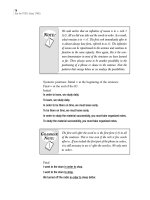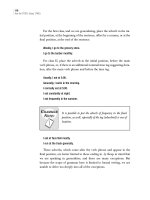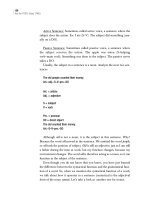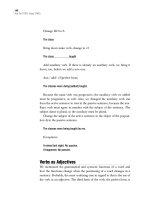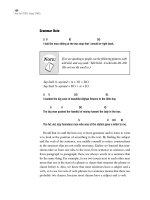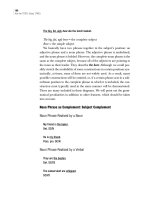Ace the toefl essay part 14
Bạn đang xem bản rút gọn của tài liệu. Xem và tải ngay bản đầy đủ của tài liệu tại đây (146.98 KB, 10 trang )
120
Ace the TOEFL Essay (TWE)
24. The tint seemed_____(more radiant, more radiantly, radianter)
compared to that of yesterday.
25. The army looked_____(forcefully, forceful, forcefuller) in their
gear. Copula verb.
Pronouns
Pronouns are words that take the place of a noun in a sentence. The pre-
fix
pro means for or in the place of. There are subject pronouns and object
pronouns. In an active statement, the subject comes before the verb, and
the object comes after the verb, or the object pronoun comes after the
preposition.
Personal Pronouns:
Subject Object
Singular Singular
I, you, he, she, it me, you, him, her, it
Plural Plural
We, you, them us, you, them
Reflexive Pronouns
S = singular, P = plural
I = myself (S)
You = yourself (S)
You = yourselves (P)
Us = ourselves (P)
Them = themselves (P)
Him = himself (S)
These can function as stress markers that come immediately after the
subject or at the end of the sentence/clause (use a reflexive pronoun
immediately after the subject to avoid problems with description).
They can also be the DOs of a sentence.
TOEFL Internals flowed 7/13/07 3:36 PM Page 120
121
Parts of Speech
Stress Markers
I myself want to vote x in this election (myself).
You
yourself should know the answer to that question (yourself).
You
yourselves know that all the work must be accurate.
We
ourselves understood everything (ourselves), unlike the rest.
They
themselves took the cat out (themselves), instead of having the maid
do it.
He
himself took the watch (himself), not his brother like you thought.
These rename the subjects, not the objects above.
As Objects
I know myself. (As DO)
You see
yourself in the mirror. (As DO)
You must ask
yourselves the question. (As indirect object [IO])
They lost
themselves in the pleasure of Rome. (As DO)
He hit
himself in the eye. (As DO)
I am proud
of myself. (As object of preposition)
We laughed at
ourselves. (As obj. of prep.)
They thought of
only themselves. (As obj. of prep.)
Functions:
1. To show emphasis, therefore placed immediately after the word it
renames, functioning as a restrictive appositive, or uncommonly
placed in a postposed position.
2. DO, comes after an action (dynamic) verb
THE
:
RE
N
OTE
:
TOEFL Internals flowed 7/13/07 3:36 PM Page 121
122
Ace the TOEFL Essay (TWE)
3. To show emphasis, placed after the IC, not as emphatic as number
1. Examples:
I myself know the truth.
I hit myself.
You yourself told me that.
You hurt yourself by playing.
He himself pulled the trigger.
He hurt himself.
She herself called off the wedding
She called herself on the phone.
The dog itself saved the little boy.
The dog bit itself.
We ourselves must solve this problem.
We cheated ourselves.
You yourselves can change this school.
You hurt yourselves by not conforming to the rules.
They themselves cleaned the house.
They answered themselves.
Postposed
I did it myself.
You won the game yourself.
He came here himself.
The dog killed the snake itself.
We remedied the problems ourselves.
You did the work yourselves.
They repaired the car themselves.
TOEFL Internals flowed 7/13/07 3:36 PM Page 122
123
Parts of Speech
A postposed reflexive pronoun means the same as if it came directly
behind the noun it renamed, but the emphasis is not as strong with post-
position. If we add the preposition
by in front of the postposed reflexive
pronoun, the meaning changes to
alone.
Ex: I did it by myself. = I did it alone.
He came here by himself. = He came here alone.
Demonstrative Pronouns
This, that, these, those
These are pronouns; therefore, they can act as subjects and objects in
a sentence. However, when used before a noun, they become demonstra-
tive adjectives. The word
demonstrative is simply the adjectival form of the
word
demonstrate, which means to show.
This is my coat. (near)
That is the building. (far)
These are the cards. (near)
Those are my friends. (far)
This coat is mine.
That house is mine.
These cards are for you.
Those boys are my friends.
Possessive Pronouns
(1) Before the subject; (2) before the object = my, your, his, her, their, our,
its; and (3) only after a linking verb (LV; a be verb) = mine, hers, theirs,
ours
Syntactic Positioning:
1. Before the subject
2. Before the object
The possessive pronouns in classes 1 and 2 must have a noun after
them, except for
his and its.
3. The possessive pronouns in this class must come after an LV. We
TOEFL Internals flowed 7/13/07 3:36 PM Page 123
124
Ace the TOEFL Essay (TWE)
designate a be verb as an LV when it is the only verb in the verb phrase
of the main clause of the superstructure. See below.
This is mine. Is = LV. (only verb in the verb phrase)
This key, the one you say was found,
is mine. Is = LV
In the interjectory clause, the one you say was found, the verb phrase is
was found. Was is not an LV, because it is an auxiliary verb, called a help-
ing verb, and
found is the main verb of the verb phrase of that DC.
My book is here.
He gave me my book.
It is mine.
Your book is here.
I have your book.
This is yours. (singular and plural)
His dog ran away.
I saw his dog.
The dog is his.
Her cat is over there.
I saw her cat.
The cat is hers.
Its tire is going flat.
The dog wagged its tail.
This is its bone.
Our day is very long.
This is our day.
This table is ours.
This class is yours. (Can be plural or singular, only postposed)
The table is theirs. (Only plural, only postposed)
TOEFL Internals flowed 7/13/07 3:36 PM Page 124
